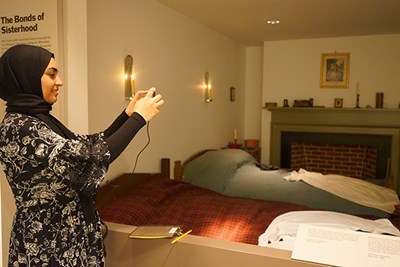Declaration Aligns with UML Values of Inclusion and Sustainability
 Image by Tory Wesnofske
Image by Tory Wesnofske
11/28/2018
By Katharine Webster
Chancellor Jacquie Moloney became the first U.S. university leader to sign an international accord that reaffirms a commitment to human rights – and that also says humans have a responsibility to protect the environment for future generations.
The Universal Declaration of Humankind Rights and Duties is a grassroots initiative that started in France. It builds on the Universal Declaration of Human Rights adopted by the United Nations 70 years ago on Dec. 10, 1948, in the aftermath of World War II.
Moloney says the declaration underscores two of the five Pillars of Excellence that define the university’s 2020 Strategic Plan: entrepreneurial stewardship, and global engagement and an inclusive culture.
“Signing this declaration reaffirms UMass Lowell’s commitment to diversity and inclusion on our campus and in our partnerships with people and organizations here and around the globe,” the chancellor says. “It also affirms our commitment to do all we can to reduce our carbon footprint and build a more sustainable future for everyone through our research, community and international partnerships and campus efforts.”
Andre DiFilippo, president of the Student Government Association, says the SGA Senate will also take up a resolution supporting the declaration.
“It focuses on climate change and the effects that has on the environment and humanity on a global scale, and I support that because that really aligns heavily with the goals that we as a university pursue,” DiFilippo says.
Student senator Simthyrearch Dy attended the formal signing last week to represent the SGA, while interim Biology Chairman Michael Graves came as president of the Faculty Senate. Other members of the chancellor’s cabinet and the 2020 Strategic Planning Commission also witnessed it.
 Image by Tory Wesnofske
Image by Tory Wesnofske
Noureddine Melikechi, dean of the Kennedy College of Sciences, is an ambassador for the Human Rights’ Friends Association, which is promoting the declaration. The declaration originated with Corinne Lepage, former French minister of the environment.
UMass Lowell is the first U.S. university and among the first U.S. institutions to sign the declaration, Melikechi says. Once enough organizations have signed, it will be presented to the United Nations for adoption.
“I thought that it would be good for our institution to be a leader in the U.S. in supporting such a movement, which essentially adds to the existing U.N. resolution a major and noble dimension – caring for the planet future generations will inherit,” Melikechi says.
“Those are the values that underlie everything we’re trying to do here at the university. I believe that the declaration can guide and shape our relationships with the environment and among different generations, helping to create peaceful and sustainable international communities.”
Leslie Wong, director of the Office of Multicultural Affairs and assistant dean of student affairs for equity and inclusion, says Melikechi brought the resolution to her and Senior Associate Vice Chancellor Lauren Turner last summer. The three co-chair the Global Engagement and Inclusive Community Committee, part of the 2020 Strategic Planning Commission. The committee enthusiastically supported the effort.
“The Universal Declaration of Humankind Rights and Duties advances the idea of community responsibility to protect all members of the human family through democratic, ecological and peaceful means,” Wong says. “We immediately felt this was a natural fit to our work, as well as resonating strongly with the spirit of UMass Lowell.”
Wong says the declaration speaks to the nature of social and environmental justice work, both here and around the world.
“I believe if we want any chance of a life where our children, family, neighbors and global citizens can truly live without fear of repression, oppression, poverty and violence, we must begin to see that any injustice anywhere is a threat to justice everywhere,” she says.
“Doing the work of protecting human rights and the dignity of humanity while safeguarding our environment and its resources is a gift that we have each day – to have the ability to make a difference somewhere or to someone.”




